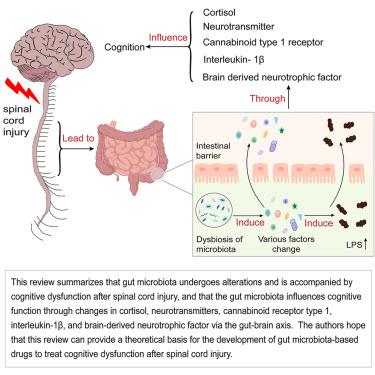Research progress of intestinal microbiota on cognitive dysfunction after spinal cord injury
IF 4.1
2区 综合性期刊
Q1 MULTIDISCIPLINARY SCIENCES
引用次数: 0
Abstract
Alterations in the gut microbiota are among the most common phenomena following spinal cord injury, often accompanied by cognitive impairment. Numerous studies have reported intrinsic links among these three aspects. However, the molecular mechanisms by which the gut microbiota influence cognitive function after spinal cord injury, as well as strategies for modulating the gut microbiota to treat cognitive deficits, remain inadequately summarized. Therefore, this review provides a comprehensive summary of the key mechanisms by which gut dysbiosis contributes to cognitive impairment and discusses therapeutic strategies targeting the gut microbiota. These insights may offer a theoretical basis for further research and microbiota-based drug development for cognitive dysfunction following spinal cord injury.

脊髓损伤后肠道菌群与认知功能障碍的研究进展
肠道微生物群的改变是脊髓损伤后最常见的现象之一,通常伴有认知障碍。大量研究报告了这三个方面之间的内在联系。然而,肠道微生物群影响脊髓损伤后认知功能的分子机制,以及调节肠道微生物群治疗认知缺陷的策略,仍然没有得到充分的总结。因此,本文综述了肠道生态失调导致认知障碍的关键机制,并讨论了针对肠道微生物群的治疗策略。这些发现可能为脊髓损伤后认知功能障碍的进一步研究和基于微生物群的药物开发提供理论基础。
本文章由计算机程序翻译,如有差异,请以英文原文为准。
求助全文
约1分钟内获得全文
求助全文
来源期刊

iScience
Multidisciplinary-Multidisciplinary
CiteScore
7.20
自引率
1.70%
发文量
1972
审稿时长
6 weeks
期刊介绍:
Science has many big remaining questions. To address them, we will need to work collaboratively and across disciplines. The goal of iScience is to help fuel that type of interdisciplinary thinking. iScience is a new open-access journal from Cell Press that provides a platform for original research in the life, physical, and earth sciences. The primary criterion for publication in iScience is a significant contribution to a relevant field combined with robust results and underlying methodology. The advances appearing in iScience include both fundamental and applied investigations across this interdisciplinary range of topic areas. To support transparency in scientific investigation, we are happy to consider replication studies and papers that describe negative results.
We know you want your work to be published quickly and to be widely visible within your community and beyond. With the strong international reputation of Cell Press behind it, publication in iScience will help your work garner the attention and recognition it merits. Like all Cell Press journals, iScience prioritizes rapid publication. Our editorial team pays special attention to high-quality author service and to efficient, clear-cut decisions based on the information available within the manuscript. iScience taps into the expertise across Cell Press journals and selected partners to inform our editorial decisions and help publish your science in a timely and seamless way.
 求助内容:
求助内容: 应助结果提醒方式:
应助结果提醒方式:


